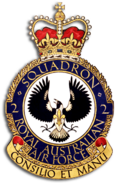No. 2 Squadron RAAF
| No. 2 Squadron RAAF | |
|---|---|

No. 2 Squadron's crest
|
|
| Active | 1916–19 1922 1937–82 2000–current |
| Country | Australia |
| Branch | Royal Australian Air Force |
| Role | Airborne Early Warning and Control |
| Part of | No. 42 Wing, Surveillance & Response Group |
| Base | RAAF Base Williamtown |
| Motto(s) |
Consilio et manu ("To Advise and to Strike") |
| Engagements |
World War I World War II Military intervention against ISIS |
| Decorations |
Presidential Unit Citation (United States) USAF Outstanding Unit Commendation (United States) |
| Commanders | |
| Notable commanders |
Oswald Watt (1916–18) Alan Charlesworth (1939) Peter Raw (1953–55) |
| Aircraft flown | |
| Electronic warfare |
Boeing 737 AEW&C "Wedgetail" |
World War I
World War II
Presidential Unit Citation (United States)
No. 2 Squadron is a Royal Australian Air Force (RAAF) squadron that operates from RAAF Base Williamtown, near Newcastle, New South Wales. From its formation in 1916 as part of the Australian Flying Corps, it has flown a variety of aircraft types including fighters, bombers, and Airborne Early Warning & Control (AEW&C). During World War I, the squadron operated on the Western Front conducting fighter sweeps and ground-attack missions. It was disbanded in mid-1919, following the end of hostilities. The squadron was briefly re-raised in 1922 as part of the newly independent RAAF, but was disbanded after only a couple of months and not reformed until 1937. It saw action as a bomber unit in the South West Pacific theatre of World War II and, equipped with English Electric Canberra jets, in the Malayan Emergency and the Vietnam War. The squadron was again disbanded in 1982, following the retirement of the Canberra. It was re-formed in 2000 to operate the Boeing 737 AEW&C "Wedgetail". One of the six Boeing 737s was deployed to the Middle East in September 2014, as part of Australia's contribution to the military coalition against ISIS.
...
Wikipedia
